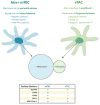Control of central and peripheral tolerance by Aire
- PMID: 21488892
- PMCID: PMC3093413
- DOI: 10.1111/j.1600-065X.2011.01008.x
Control of central and peripheral tolerance by Aire
Abstract
The negative selection of self-reactive thymocytes depends on the expression of tissue-specific antigens by medullary thymic epithelial cells. The autoimmune regulator (Aire) protein plays an important role in turning on these antigens, and the absence of even one Aire-induced tissue-specific antigen in the thymus can lead to autoimmunity in the antigen-expressing target organ. Recently, Aire protein has been detected in peripheral lymphoid organs, suggesting that peripheral Aire plays a complementary role here. In these peripheral sites, Aire was found to regulate the expression of a group of tissue-specific antigens that is distinct from those expressed in the thymus. Furthermore, transgenic antigen expression in extrathymic Aire-expressing cells (eTACs) can mediate deletional tolerance, but the immunological relevance of Aire-dependent, endogenous tissue-specific antigens remains to be determined.
© 2011 John Wiley & Sons A/S.
Figures


References
-
- Washburn T, et al. Notch activity influences the αβ versus γδ T cell lineage decision. Cell. 1997;88:833–843. - PubMed
-
- Wolfer A, Wilson A, Nemir M, MacDonald HR, Radtke F. Inactivation of Notch1 impairs VDJβ rearrangement and allows pre-TCR-independent survival of early αβ lineage thymocytes. Immunity. 2002;16:869–879. - PubMed
-
- Rothenberg EV, Dionne CJ. Lineage plasticity and commitment in T-cell development. Immunol Rev. 2002;187:96–115. - PubMed
-
- Fehling HJ, Krotkova A, Saint-Ruf C, von Boehmer H. Crucial role of the pre-T-cell receptor α in development of αβ but not γδ T cells. Nature. 1995;375:795–798. - PubMed
-
- Irving BA, Alt FW, Killeen N. Thymocyte development in the absence of pre-T cell receptor extracellular immunoglobulin domains. Science. 1998;280:905–908. - PubMed
Publication types
MeSH terms
Substances
Grants and funding
LinkOut - more resources
Full Text Sources
Other Literature Sources
Medical

